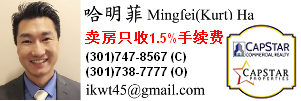
Tel: 551-580-4856 | Email: F.WINNIE.S@GMAIL.COM
习近平电贺朱立伦当选国民党主席
来自 / 联合早报 | 文 / 温伟中 台北特派员
9/27/2021
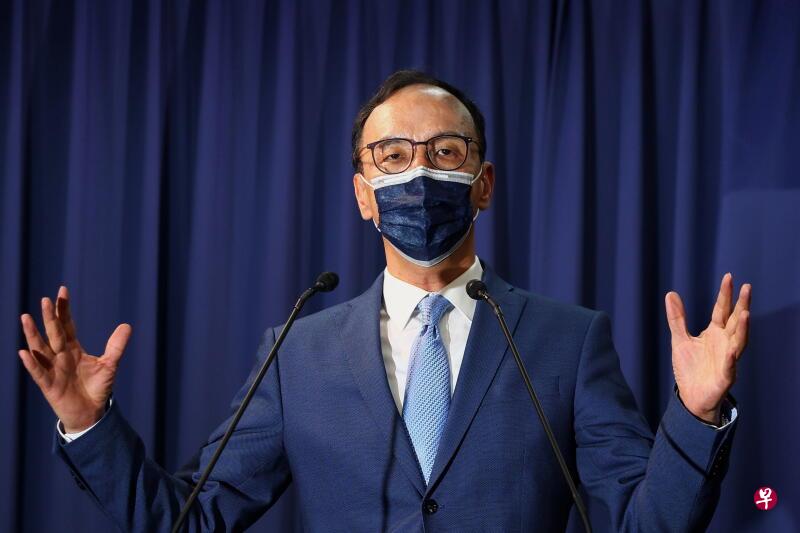
学者黄介正指出,习近平虽首次在贺电中提到“为国家谋统一”,但主轴仍是和平发展,没有施压促统意味;朱立伦回应时也谈到和平发展,没有回应统一问题,说明双方都意识到统一并非当前急务。
中共总书记习近平昨天发贺电祝贺朱立伦当选国民党主席,呼吁国共两党“为台海谋和平,为国家谋统一”。朱立伦也以国民党主席当选人身份回复致谢,希望两党在“九二共识”“反对台独”基础上求同尊异,他也批评民进党政府採取“去中”“反中”政策,改变两岸现状。
受访学者指出,国共互动回到正轨,有利台海局势稳定;但互动成果也必须实质促进和平、改善民生,才有助国民党扩大民意基础、赢取民心并重返执政。
台湾最大在野党国民党的党主席选举成绩星期六出炉,60岁的会计学教授朱立伦以45.78%的得票率当选,击败凭清晰两岸论述与炮打执政党而人气高涨的张亚中。朱立伦一胜选就宣布,计划恢复所有两岸沟通管道和交流平台。
国民党中央昨早收到中共总书记习近平的贺电,朱立伦昨天中午复电致谢。
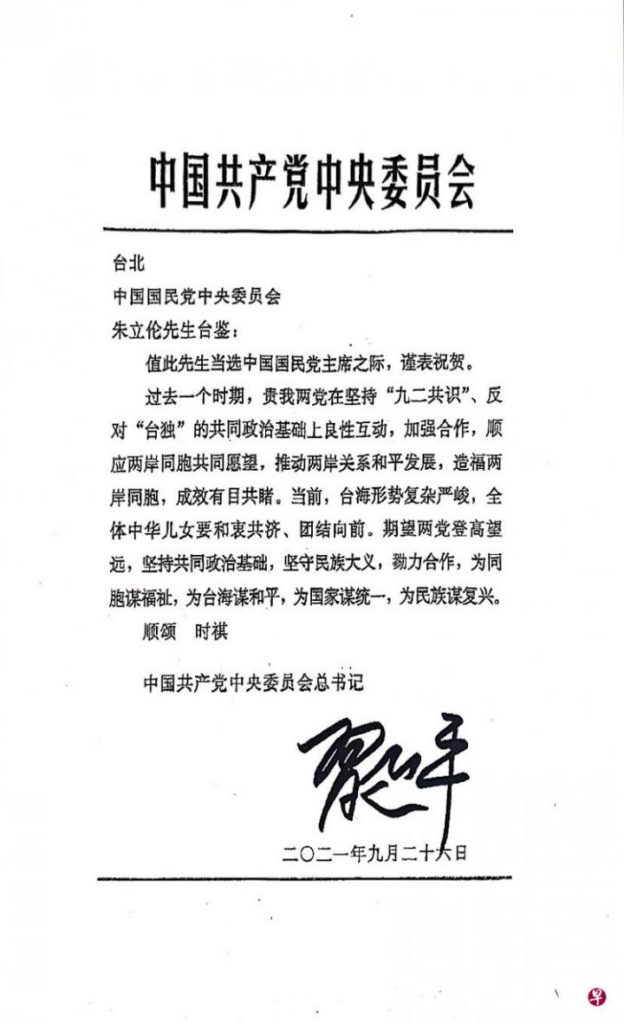
据国民党提供的来往信函,习近平以“中国国民党中央委员会朱立伦先生”称呼朱立伦,落款名为“中国共产党中央委员会总书记习近平”。
习近平在贺电中说,过去一个时期,国共两党在坚持九二共识、反对台独的共同政治基础上良性互动,推动两岸关系和平发展,“造福两岸同胞,成效有目共睹”。他表示,当前台海形势复杂严峻,呼吁两党坚持共同政治基础,坚守民族大义,“为同胞谋福祉,为台海谋和平,为国家谋统一,为民族谋复兴”。
朱立伦以国民党主席当选人身份复电时说,两岸关系30多年来,在国共两党努力推动下,各层面交流合作获得良性进展,但民进党执政后采取“去中”“反中”政策,“改变两岸现状,造成两岸形势险峻,使两岸人民极度不安”。
他也表示,两岸人民同为炎黄子孙,深盼今后两党在九二共识、反对台独基础上,求同尊异,增进互信融合,加强交流合作,造福两岸人民、促进台海稳定。
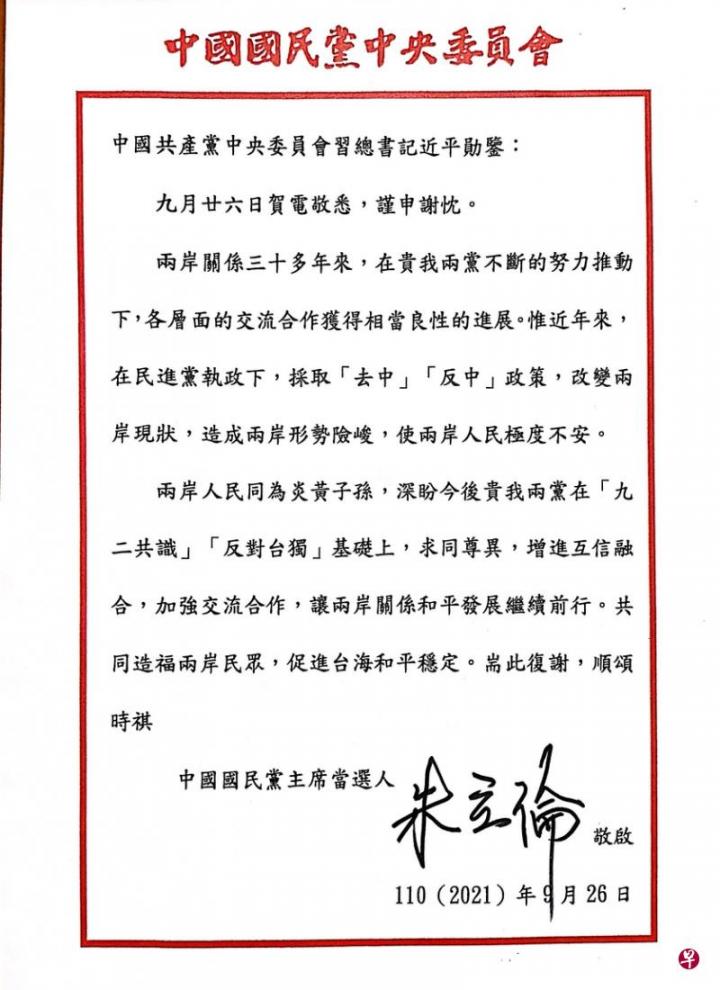
曾在陈水扁政府担任大陆委员会副主委、现任淡江大学战略研究所副教授的黄介正接受《联合早报》采访时说,去年补选江启臣当选后,习近平没有循例发贺电,说明大陆对其两岸路线有疑虑。
黄介正指出,习近平在朱立伦当选隔天就发贺电,用词客气尊重,显示国共互动恢复正常,有利民间更多交流与台海稳定。
他指出,习近平虽首次在贺电中提到“为国家谋统一”,但主轴仍是和平发展,没有施压促统意味;朱立伦回应时也谈到和平发展,没有回应统一问题,说明双方都意识到统一并非当前急务。
马英九政府的两岸政策核心智囊、淡江大学中国大陆研究所荣誉教授赵春山则向本报点评,朱立伦凭中道稳健的两岸路线与鲜明反独立场,取得大陆正向回应。他认为,有关贺电与复电是“国共关系发展的两封重要信函”,双方有关九二共识、反对台独、交流融合、谋求和平与造福两岸民众的文字表述,将让国共回到互动正轨,有利两岸和平。
赵春山指出,两岸当前急务是处理冠病疫情对经济的冲击。对于国共互动对岛内政治和两岸关系的影响,他认为关键在于国共交流的成果是否带来台海和平、改善民生经济,让蓝军扩大中间选民的支持,“否则老百姓就会把怨气出在国民党身上”。
新任党主席首度在对大陆的复电内容批评民进党,两名学者都认为朱立伦点出中共对民进党反中政策的顾虑,有助建立国共互信,也回应并安抚三分之一支持张亚中炮打执政党的党员心声,有利党内整合,是经过计算的“一石二鸟”表态。但代价是立即引起民进党政府指责背离主流民意,陷入岛内政治攻防。
(记者是《联合早报》台北特派员)
陈茂波:美国企图打“香港牌”遏制中国发展
9/26/2021
中国外交部早前发表《美国干预香港事务、支持反中乱港势力事实清单》,香港财政司司长陈茂波今天表示,该清单列举超过100项例证,揭示美国以刻意鼓动甚至直接介入的方式作出卑劣行径,包括包庇支持反中乱港分子等,企图透过打“香港牌”以遏制中国的发展。
陈茂波今天在财政司长网志(博客)撰文称,面对外国政治势力的侵扰祸害,北京果断且及时地制定和实施《香港国安法》,恢复了香港的安全和稳定;而修改选举制度,从制度上落实“爱国者治港”的原则,推动香港迎来由治及兴的新阶段。
陈茂波指出,当国家为维护主权、国家安全及发展利益而实施《香港国安法》之时,美国却借机污蔑和抹黑这些举措,并以无理手段回应。不过现实是,自《香港国安法》落实后,社会回复安宁和稳定。
陈茂波强调,香港昔日的成功、现在的发展与未来的机遇都离不开国家支持,美国或其他国家应切实尊重中国的国家主权,遵守国际关系基本原则,不应干预香港事务。同时,香港会继续是自由、公平和开放的市场,欢迎世界各地的企业和投资者前来分享发展利益。
中国外交部发布美国干预香港事务清单
9/24/2021
中国外交部发布了一份“美国干预香港事务、支持反中乱港势力事实清单”。
据中国外交部官网消息,外交部罗列的美国干预香港事务的清单中包括,美国炮制涉港法案,抹黑中方对港政策;对中国全国人大委员实施制裁;包庇支持反中乱港分子、多边串联施压;纠集盟友联手干涉香港事务;污蔑诋毁特区事务等。
清单中提到,美国前任总统特朗普2019年11月27日,签署“香港人权与民主法案”和“禁止向香港警方出口相关弹药物项法案”,要求美国务卿每年提交香港事务报告,禁止美国向香港出口催泪瓦斯、胡椒喷雾、橡胶弹和电击枪等警用装备。随后在去年7月14日,特朗普又签订“香港自治法案”、“关于香港正常化的总统行政令”,暂停和取消给予香港的特殊优惠待遇、授权对香港实体和个人实施制裁等。
外交部还罗列了美国为阻碍《香港国安法》实施,对中国内地和香港官员实施的制裁。清单中还包括美国批评香港警方执法行动的言论、支持“港独”等主张、以及就香港问题多边施压中国内地等的行为。
另据《星岛日报》报道,中国外交部驻港公署发言人就该清单表示,清单记录美国粗暴干预香港事务、破坏香港繁荣稳定的“罪证”,清单是对企图干预中国内政、遏制中国发展的外部势力敲响的“警世钟”,清单的发布向世界昭告,中国的主权、安全、发展利益不容挑战,中国全面准确贯彻落实“一国两制”方针的决心不容置疑。
中华人民共和国外交部
美国干预香港事务、支持反中乱港势力事实清单
2021-09-24
一、炮制涉港法案,抹黑中方对港政策,插手香港内部事务,大肆干涉中国内政。
1、2019年11月27日,时任美国总统特朗普为显示对反中乱港势力支持、阻挠中国中央和香港特区政府止暴制乱、恢复秩序的努力,签署美国国会炮制的“香港人权与民主法案”和“禁止向香港警方出口相关弹药物项法案”。有关法案污蔑中国中央政府破坏香港高度自治,授权美总统对中方相关官员采取拒绝入境、冻结在美资产等制裁措施,并要求美国务卿每年提交香港事务报告,禁止美国向香港出口催泪瓦斯、胡椒喷雾、橡胶弹和电击枪等警用装备。
2、2020年7月14日,时任美国总统特朗普签署“香港自治法案”。该法要求制裁所谓与中方违反涉港义务有关的外国个人或实体,以及同相关个人或实体进行重要交易的外国金融机构,并支持所谓受“迫害”香港居民入境美国。同日,特朗普签署13936号“关于香港正常化的总统行政令”,认定香港局势对美国家安全、外交政策和经济构成威胁,并据此宣布国家紧急状态,包括暂停和取消给予香港的特殊优惠待遇、授权对香港实体和个人实施制裁等。
3、2021年2月18日,美国国会众议院外委会主席米克斯提出所谓“谴责中国和香港特别行政区继续侵犯香港民众权利自由的决议案”,污蔑抹黑中国中央政府和香港特区政府维护法治和社会秩序稳定、保护香港居民人身财产安全的努力,该案于4月19日获众议院全会审议通过。
4、美国国会正在审议数项涉港消极法案,包括:2021年1月25日和2月8日,美共和党联邦众议员柯蒂斯和联邦参议员鲁比欧分别在众议院、参议院提出“香港安全港法案”,要求美政府给参与香港暴乱的“港独”分子提供难民身份;2021年3月18日,共和党联邦参议员鲁比欧提出所谓“谴责中国政府和中国共产党在香港实施镇压,包括拘捕民主派人士、一再违反《中英联合声明》和香港基本法的决议案”;2021年6月24日,共和党联邦参议员萨斯提出“香港民主国会金质奖章法案”,鼓噪向黎智英、罗伟光、张剑虹、周达权、陈沛敏、张志伟、杨清奇等香港《苹果日报》高管及该报所有工作人员颁发美国会金质奖章;2021年6月30日,民主党联邦众议员马利诺夫斯基提出“2021年香港人民自由与选择法案”,要求为反中乱港分子、违法犯罪人员提供庇护,为他们提供赴美便捷通道;2021年6月30日,共和党联邦众议员佩里提出“香港自由法案”,要求授权美总统承认香港特区是“独立国家”。
二、悍然实施制裁,妄图阻挠香港国安法和中国全国人大有关决定在香港顺利实施。
1、2020年5月29日,时任美国总统特朗普宣布取消香港特殊地位和香港商业优惠措施。
2、2020年6月29日,时任美国国务卿蓬佩奥宣布,即日起禁止美防卫装备出口香港,并限制美国防、军民两用技术出口香港。
3、2020年6月29日,时任美国商务部长罗斯发表声明,正式取消对香港的特殊贸易待遇,禁止向香港出售军民两用高科技装备,并将继续评估取消香港其他特别待遇。
4、2020年6月30日,美国商务部宣布终止香港出口许可例外待遇,禁止向香港出口国防设备和敏感技术。
5、2020年8月7日,美国政府以实施香港国安法、破坏香港高度自治为由,宣布制裁11名中国中央政府和香港特区政府官员。
6、2020年8月11日,美国国土安全部宣布,自9月25日起,香港出口美国商品必须注明来源地为“中国”,禁止使用“香港制造”标签。
7、2020年8月19日,美国国务院宣布暂停或终止同香港签署的移交逃犯、移交被判刑人员、豁免国际船运利得税等三项双边协议。
8、2020年10月14日,美国国务院根据“香港自治法”要求向美国国会提交首份涉港报告,将10名中国中央政府和香港特区政府官员列为所谓破坏香港自治人员,威胁对与上述人员有关的金融机构实施制裁。
9、2020年11月9日,美国国务院以所谓威胁香港和平、安全和高度自治为由,宣布制裁4名中国中央政府和香港特区政府官员。
10、2020年12月7日,美国国务院以中国全国人大常委会制定香港国安法、取消4名香港立法会反对派议员资格等为由,对14名中国全国人大常委会副委员长实施制裁。
11、2021年1月15日,时任美国国务卿蓬佩奥发表声明,以香港警方拘捕55名所谓民主派人士为由,对6名中国中央政府和香港特区政府官员实施制裁。
12、2021年3月16日,美国国务院更新“香港自治法”报告,以中国全国人大通过完善香港选举制度的有关决定和实施香港国安法等为由,宣布更新涉港制裁人员名单和追加金融制裁措施。
13、2021年7月7日,美国白宫发布所谓《与香港有关国家紧急状态继续实施的通知》,宣布延长所谓“针对香港局势宣布的国家紧急状态”,延长美国对港制裁措施一年。
14、2021年7月16日,美国国务院、商务部、国土安全部和财政部以特区实施香港国安法、《苹果日报》停刊等为由,炮制所谓“香港商业警告”,抹黑香港营商环境,唱衰香港发展和“一国两制”前景,并宣布制裁7名香港中联办官员。美国国务卿布林肯并发表所谓香港国安法实施一周年声明,诋毁国安法,攻击中国政府对港政策。
三、污蔑诋毁特区事务,妄议香港警方执法行动,破坏香港繁荣稳定。
1、2019年2月25日,时任美国驻港总领事唐伟康在接受采访时公开表达对特区政府拟推动修订《逃犯条例》的担忧,声称修例可能影响美国和香港的双边协议实施。
2、2019年3月21日,美国国务院发表“2019年香港政策法报告”,妄称香港言论自由被侵蚀,中国政府加大干预香港事务,在多方面对香港造成损害。
3、2019年5月7日,美国国会“美中经济与安全评估委员会”发表报告,污蔑特区政府修订《逃犯条例》“侵蚀香港的自治”,对美国国家安全和美国在港经济利益构成严重风险。
4、2019年5月16日,美国国务院发表声明,诬称特区政府修订《逃犯条例》威胁香港法治,对此感到担忧。
5、2019年6月19日,美国国会众议长佩洛西在《基督科学箴言报》早餐会发言时,无视反中乱港分子的各种极端暴行,声称“有200万人上街反对修订《逃犯条例》,那不是一道美丽的风景线吗?”,公然纵容和鼓励反中乱港分子采取违法暴力手段同中央和特区政府对抗。
6、2019年7月26日,时任美国国会众议院外委会主席恩格尔诬称香港警方在处理示威中使用暴力,令香港在管治和司法方面的国际声誉受损。
7、2019年9月17日,美国“国会—行政部门中国委员会”举行香港局势听证会,美化反修例暴力示威游行,抹黑特区政府与香港警察有关处置,诬称其破坏“一国两制”和香港自治。
8、2019年9月28日,美国“国会—行政部门中国委员会”就香港“占中”五周年发表声明,抹黑“一国两制”和中央对港政策。
9、2019年10月7日,时任美国总统特朗普表示,希望香港抗议问题人道解决,香港民众很伟大,他们挥舞美国国旗,有超过200万人参与抗议,以前从来没有这样的事情。
10、2019年10月24日,时任美国副总统彭斯在华盛顿智库威尔逊中心发表反华演讲,多次提及香港“修例风波”,妄称“香港是一个活生生的例子,表明中国如果拥抱自由将会发生什么”。
11、2019年11月21日,美国国会众议长佩洛西在“香港人权与民主法案”通过审议后发表公开讲话,妄称“中国对香港完全自治的承诺已被打破”,刻意歪曲“一国两制”、混淆是非。
12、2019年12月10日,美国驻港总领事史墨客在香港《明报》撰文,扬言“美国对香港人权承诺始终如一”,妄称“美制定‘香港人权与民主法案’表明美对普世价值的承诺,反映美关注北京侵蚀香港自治”。
13、2020年5月22日,时任美国国务卿蓬佩奥就中国全国人大通过《关于建立健全香港特别行政区维护国家安全的法律制度和执行机制的决定》发表声明,将香港国安法污蔑为“强加”,“破坏香港高度自治”。
14、2020年5月27日,时任美国国务卿蓬佩奥再次就中国全国人大即将审议通过香港国安法发表声明,妄言美国希望香港作为“自由堡垒”能够成为“专制”中国的榜样,并向美国国会“证实”香港不应再享有1997年7月前美国法律赋予其的待遇。
15、2020年5月28日,美国国务院向国会提交“2020年香港政策法报告”,证实香港不能继续享有美国法律规定的特殊待遇。
16、2020年6月30日,时任美国国务卿蓬佩奥发表声明,诬称实施香港国安法破坏“一国两制”,违反《中英联合声明》和香港基本法所作承诺。
17、2020年7月1日,美国国会众议长佩洛西在美国国会众议院通过“香港自治法案”后诬称,香港国安法对香港是“残酷和全面的镇压,破坏香港自由,标志‘一国两制’的死亡”。
18、2020年7月6日,美国驻港总领事史墨客接受采访时诬称香港国安法侵蚀香港人基本人权自由,营造自我审查氛围,是香港的悲剧。
19、2020年7月14日,时任美国国务卿蓬佩奥发表声明,支持香港反对派非法举行的所谓“初选”。
20、2020年7月23日,时任美国国务卿蓬佩奥发表所谓“共产党中国与自由世界的未来”反华演讲,恶意攻击中国共产党领导和中国政治制度,散播中国威胁论,污蔑所谓中国共产党加强对香港的控制,将罗冠聪等反中乱港分子美化为民主斗士。
21、2020年7月31日,时任美国白宫发言人麦克纳尼表示,美方反对香港特区政府取消反对派候选人资格。
22、2020年8月7日,美国驻港总领馆发表声明,诬称“香港国安法的目的不是营造安全,而是要迫使民主派人士噤声”,公然抹黑攻击香港国安法。
23、2020年9月11日,时任美国国务卿蓬佩奥就12港人偷渡案发表声明,对案件指手画脚,干预中国司法主权。
24、2020年11月11日,时任美国总统国家安全事务助理奥布莱恩声称,中方剥夺香港立法会反对派议员资格的行为违反了《中英联合声明》,美方将确认并制裁剥夺香港自由的责任人。
25、2020年11月12日,时任美国国务卿蓬佩奥就4名反对派议员资格被取消发表声明,将中国全国人大的合法决定污蔑为“对香港自由的猛烈攻击”,叫嚣将“追究侵蚀香港自治与自由的官员责任”。
26、2021年1月6日,时任美国国务卿蓬佩奥就香港警方依法逮捕涉嫌违反香港国安法的53名香港反对派人士发表声明,叫嚣要求中方“立即无条件释放有关人员”,并扬言威胁采取进一步制裁措施。
27、2021年1月14日,美国“国会—行政部门中国委员会”发表所谓“2020年度报告”,诬称“一国两制”框架已被摧毁,扬言通过本国法律庇护香港违法犯罪分子,对特区政府依法施政蛮横施压。
28、2021年3月11日,美国国务院发言人妄议中国全国人大通过《关于完善香港特别行政区选举制度的决定》,诬称中国持续攻击香港民主制度,打击香港民主进程。
29、2021年3月11日,美国国务卿布林肯就中国全国人大通过《关于完善香港特别行政区选举制度的决定》发表声明,妄称这是“对香港自治、自由和民主进程的直接攻击”。
30、2021年3月30日,美国国务院发表所谓“2020年度国别人权报告”,污蔑香港国安法,抹黑特区政府依法施政和警方严正执法。
31、2021年3月31日,美国国务院发表“2021年香港政策法报告”,诬称中方破坏香港自治,削弱港人权利和自由,声称香港不再享有美国法律此前给予的特殊待遇。
32、2021年4月1日,美国驻港总领事史墨客接受媒体采访并在《南华早报》、《明报》等媒体发文,公然污蔑中方完善香港特区选举制度和制定实施香港国安法的重大举措,诬称修改香港选举制度将使香港选举结果不再有意义,并以所谓制裁相威胁,极力为反中乱港分子撑腰打气。
33、2021年4月16日,美国国会众议长佩洛西推特发文,诬称逮捕李柱铭等反中乱港分子是“北京攻击法治的又一迹象”并“感到悲伤和不安”。
34、2021年4月17日,美国国务卿布林肯推特发文,诬称以政治动机判刑“不可接受”,呼吁“释放”反中乱港分子。
35、2021年5月7日,美国国务卿布林肯推特发文,妄言“美国与香港人民站在一起”并拒绝判决,呼吁“立即释放”反中乱港分子。
36、2021年5月27日,美国国务卿布林肯在国务院网站发表声明,诬称中国政府破坏香港民主制度,呼吁释放所有根据香港国安法被逮捕的人并撤销指控。
37、2021年6月3日,美国国务卿布林肯在国务院网站发表声明,声称要与要求中国政府尊重所谓“普世人权”的中国人士“站在一起”,并称反中乱港分子为“勇敢的活动家”。
38、2021年6月4日,美国驻港总领馆在该馆办公室窗内点亮电子烛光,呼应反中乱港势力搞所谓“烛光纪念”。
39、2021年6月5日,美国国务卿布林肯推特发文,公然声称被反中乱港势力鼓舞,无理要求“立即释放被逮捕香港人士”。
40、2021年6月11日,美国驻港总领事史墨客接受路透社采访,污蔑国安法的实施在香港创造了一种“强制气氛”,威胁到香港的自由及其作为国际商业中心的地位。
41、2021年6月21日,美国国务院发言人在记者会上打着“新闻自由”幌子,抹黑香港特区政府以香港国安法压迫独立媒体、扼杀言论自由。
42、2021年6月24日,美国总统拜登在白宫网站发表声明,以新闻自由为借口,诬称《苹果日报》停刊“对媒体自由来说是悲伤的一天”,标志着“北京正在加强镇压力度”。
43、2021年6月29日,美国“国会—行政部门中国委员会”举办关于香港国安法实施一周年圆桌会议,妄议香港人权、法治。
44、2021年6月30日,美国驻港总领馆罔顾事实,在香港国安法实施一周年之际,诬称香港国安法破坏香港言论自由,公然诋毁香港国安法。
45、2021年7月1日,美国国务院发表所谓“2021年度人口贩运问题国别报告”,其中涉华内容诋毁贬损特区打击人口贩运的努力和成效,妖魔化香港国安法。
46、2021年7月13日,美国国务院发言人诬称中国持续削弱香港自治,破坏香港营商环境,呼吁国际社会关注。
47、2021年7月21日,美国国务院发布所谓投资环境报告,其中涉及香港内容再次炒作所谓香港国安法风险,抹黑香港营商环境。
48、2021年8月2日,美国驻港总领馆网站刊登所谓香港国安法“见证清单”,列出所有依法被处理的反中乱港分子姓名、被逮捕时间、被指控时间、被指控罪名、判刑结果等信息。
四、包庇支持反中乱港分子,为其兜售“港独”主张、散播政治谎言提供平台,是非不分、颠倒黑白为违法分子说项。
1、2019年3月17日,美国驻港总领馆安排美国国会众议院“美中工作小组”代表团访港期间同陈方安生、李柱铭、黄之锋等座谈。上述人员在会见后向媒体表示,他们同美方讨论了特区政府取消反对派立法会议员候选人参选资格、拟修订《逃犯条例》、香港政制发展等议题。
2、2019年3月19日至26日,陈方安生、郭荣铿、莫乃光等赴美窜访,时任美国副总统彭斯、国会众议长佩洛西、时任美国务卿高级政策顾问余茂春、国防部印太安全事务助理部长薛瑞福等官员以及美国务院打击人口贩运办公室、美“国会—行政部门中国委员会”、国会“美中经济与安全评估委员会”等机构人员分别会见。陈方安生等人请求美国政府制裁香港,乞求美支持香港反对派组织反修例运动。美方并安排上述人员在亚利桑那州立大学麦凯恩研究所、传统基金会等机构演讲,为他们兜售“港独”主张、散播政治谎言提供平台和支持。
3、2019年5月13日至17日,李柱铭、李卓人、麦燕庭、吴霭仪、涂谨申、罗冠聪六人赴美窜访。美国国会众议长佩洛西、时任国务卿蓬佩奥、白宫国安会亚洲事务高级主任波廷杰等会见。美“国会—行政部门中国委员会”组织安排上述人员参加所谓香港问题听证会,敦促特区政府撤回《逃犯条例》修订草案。
4、2019年5月14日,“美国国家民主基金会”就香港特区政府修订《逃犯条例》举行所谓“对香港公民社会和法治的新威胁”主题研讨会,并组织李柱铭等反中乱港分子参会,与会者呼吁立即采取行动,制止“恶法”。
5、2019年7月7日至11日,反中乱港分子黎智英赴美窜访,时任美国副总统彭斯、国务卿蓬佩奥、总统国家安全事务助理博尔顿、助理国务卿史达伟等官员会见。黎智英极力推动美国插手干预香港事务,同美方讨论特区修例事态发展及香港所谓“自治地位”,并获得美方积极回应。
6、2019年8月6日,香港媒体报道,“港独”组织“香港众志”头目黄之锋、罗冠聪等人同美国驻港总领馆官员会面,呼吁美尽快制订“香港人权和民主法案”、对港进行制裁。
7、2019年9月17日,美国“国会—行政部门中国委员会”组织安排黄之锋、何韵诗、罗冠聪、张崑阳等参加所谓“香港抗争之夏”及美方政策听证会,为上述人员兜售“港独”主张、散播政治谎言、抹黑中央和特区政府等提供平台和支持。
8、2019年9月17日,美国联邦参议员托德·扬在国会山参加“港独”组织“香港民主委员会”成立记者会。
9、2019年10月12日至13日,美国联邦参议员克鲁兹访港,会见黎智英、陈方安生、郭荣铿、莫乃光、梁颖敏等反中乱港头目,并公然身穿黑衣出现在示威现场,对媒体称“没有看到暴力”,污蔑克制执法的香港警队是“暴力镇压”。
10、2019年10月22日至26日,反中乱港分子黎智英、李柱铭等赴美窜访,美国国会众议长佩洛西、时任助理国务卿史达伟、“国会—行政部门中国委员会”主席麦戈文以及多名美国会议员会见。
Six Spaces Home Staging

Contact: Hongliang Zhang
Tel: 571-474-8885
Email: zhl19740122@gmail.co
11、2020年2月4日,美国联邦参议员斯科特邀请反中乱港分子罗冠聪参加总统国情咨文演说。
12、2020年3月5日,时任美国国务院东亚局助卿帮办费德玮和美驻港总领事史墨客会见莫乃光等反中乱港分子。
13、2020年3月21日,美国驻港总领事史墨客会见黄之锋、张崑阳、梁晃维等,接受黄递交的所谓“请愿信”。黄乞求美通过“香港人权与民主法案”制裁特区政府官员和警员。
14、2020年4月18日,时任美国国务卿蓬佩奥发表声明,对香港警方拘捕反中乱港分子妄加指责。
15、2020年5月27日,美国联邦参议员霍利会见黄之锋等反中乱港分子。
16、2020年7月1日,美国国会参议院外委会举办听证会,安排反中乱港分子罗冠聪、李卓人等通过视频方式参会,为其抹黑香港国安法和中央对港政策提供平台。
17、2020年7月21日,时任美国国务卿蓬佩奥在伦敦单独会见潜逃英国的“港独”分子罗冠聪,为其撑腰打气。罗大肆抹黑中央和特区政府,呼吁美加大对华施压。
18、2020年8月10日,时任美国总统国家安全事务助理奥布莱恩发表声明称,美方对黎智英等民主人士被捕深感不安,呼吁中方废除香港国安法。
19、2020年12月16日,美国国会参议院司法委员会安排“港独”分子罗冠聪以视频形式参加听证会,罗声称香港国安法限制港人言论及示威自由,呼吁美国给予更多港人庇护。
20、2021年1月6日,时任美国国务卿蓬佩奥发表声明,对50多名反中乱港分子被捕表达所谓关切。
21、2021年1月15日,时任美国国务卿蓬佩奥再次发表声明,对香港特区政府依法逮捕包括1名美国律师在内的反中乱港分子说三道四,要求中方立即释放被香港国安法制裁的个人,并撤销有关指控。
22、2021年1月31日,麦戈文、鲁比欧、默克利等9名美联邦参、众议员联名致信诺贝尔和平奖委员会,提名所谓“香港民主运动”参评2021年诺贝尔和平奖。
23、2021年2月28日,美国国务卿布林肯发推特谴责香港特区政府对香港“亲民主派”候选人的拘押和指控。
24、2021年4月16日,美国国务卿布林肯发表声明,就李柱铭、黎智英等反中乱港分子被判刑事对中方进行无端指责抹黑。
25、2021年7月8日,美国驻港总领馆政治经济处处长何朝华旁听特区法院依法审理涉嫌非法策划、组织、实施所谓“35+”和“揽炒十部曲”的相关人员,现场接受媒体采访时诬称香港国安法打压港人自由,为有关反中乱港分子美化开脱。
五、多边串联施压,纠集盟友联手干涉香港事务,通过发表联合声明等方式对香港事务说三道四、指手画脚。
1、2020年5月27日,美国常驻联合国代表团发表声明,公开要求联合国安理会讨论香港问题,妄称香港问题“具有全球紧迫性,牵涉到国际和平与安全”。
2、2020年5月28日,美国纠集英国、澳大利亚、加拿大等四国外长发表涉港联合声明,就中国全国人大涉香港国安立法说三道四,妄加指责。
3、2020年6月17日,美国等七国集团外长、欧盟高级代表发表涉港联合声明,鼓吹所谓香港国安法可能破坏“一国两制”和香港高度自治,敦促中国政府重新考虑有关决定,妄图对中方施压。
4、2020年8月9日,美国联合“五眼联盟”国家外长发表涉港问题联合声明,要求中国全国人大撤回取消4名香港反对派议员资格的决定,无端诋毁中央对港政策。
5、2020年11月18日,美国联合“五眼联盟”国家外长发表涉港联合声明,诋毁全国人大常委会关于香港特区立法会议员资格问题的决定,抹黑中方对港政策。
6、2021年1月9日,美国纠集英国、澳大利亚、加拿大等四国外长发表涉港联合声明,就香港警方依法逮捕55名反中乱港分子表达所谓严重关切,妄称香港国安法严重违反《中英联合声明》,破坏“一国两制”框架,限制港人权利与自由。
7、2021年3月12日,美国等七国集团外长和欧盟外交与安全政策高级代表发表涉港联合声明,妄称中国政府修改香港选举制度旨在消灭香港异见声音,破坏香港高度自治。
8、2021年5月5日,美国等七国集团外长会发表联合声明,抹黑中国中央政府对港政策,歪曲“一国两制”,妄评特区内部事务,为反中乱港分子撑腰打气。美国还在此次会议上推动成立所谓“香港之友”的国际组织,拉拢西方国家干预插手香港事务。
9、2021年6月13日,七国集团峰会发表新闻公报,妄议香港局势,要求中国“尊重香港的人权和基本自由,保障《中英联合声明》和基本法赋予香港的高度自治”。
10、2021年6月21日至7月14日,联合国人权理事会第47届会议期间,美国与43个国家联署加拿大发起的反华联合发言,对香港“践踏人权”的行为表示“关切”。7月1日,美国还组织香港国安法实施一年主题边会,拉拢20个国家政府和9个非政府组织参加,再次污蔑诋毁香港国安法和特区法治。
11、2021年7月10日,美国国务院网站发表美欧等21国所谓“媒体自由联盟”成员联合声明,对《苹果日报》停刊、逮捕反中乱港分子表达强烈关切,并无理指责特区依法办案,抹黑香港国安法,诋毁中央对港政策。
Fact sheet: US interference in Hong Kong affairs and support for anti-China, destabilizing forces
Ministry of Foreign Affairs of China
9/24/2021
I. Enacting Hong Kong-related Acts, vilifying China’s policy on Hong Kong, meddling in Hong Kong affairs, and wantonly interfering in China’s internal affairs.
1. On 27 November 2019, in collusion with those who are opposed to China and attempt to destabilize Hong Kong and obstruct efforts of China’s central government and the government of the Hong Kong Special Autonomous Region (HKSAR) to stop violence and restore law and order, then U.S. President Donald Trump signed into law two bills passed by the U.S. Congress, i.e. the Hong Kong Human Rights and Democracy Act of 2019 and the Act to prohibit the commercial export of covered munitions items to the Hong Kong Police Force. These bills accuse China’s central government of undermining the high degree of autonomy of Hong Kong, authorize the U.S. President to impose sanctions such as inadmissibility to the United States and asset blocking against relevant Chinese officials, require the U.S. Secretary of State to submit a report regarding Hong Kong affairs on a yearly basis, and prohibit U.S. exports of police equipment, such as tear gas, pepper spray, rubber bullets and stun guns, to Hong Kong.
2. On 14 July 2020, then U.S. President Trump signed into law the Hong Kong Autonomy Act, which requires the imposition of sanctions with respect to the foreign individuals or entities involved in the so-called erosion of certain obligations of China with respect to Hong Kong and foreign financial institutions that conduct significant transactions with those individuals or entities. It also supported permanent residents of Hong Kong who have been “persecuted” to enter the United States. On the same day, Trump signed the President’s Executive Order 13936 on Hong Kong Normalization, which determined that the situation with respect to Hong Kong constitutes a threat to the national security, foreign policy and economy of the United States. He declared a national emergency on that basis, which included measures to suspend or eliminate the different and preferential treatment for Hong Kong, and to authorize sanctions against entities and individuals with respect to Hong Kong.
3. On 18 February 2021, Gregory Meeks, Chairman of the Committee on Foreign Affairs of the U.S. House of Representatives introduced a resolution condemning the so-called “continued violation of rights and freedoms of the people of Hong Kong by the People’s Republic of China (PRC) and the Government of the Hong Kong Special Administrative Region”, which slandered the efforts made by China’s central government and the HKSAR government to uphold the rule of law, maintain order and stability and protect the life, property and safety of Hong Kong residents. The resolution was adopted by the House on 19 April.
4. The U.S. Congress is considering several other ill-intentioned bills regarding Hong Kong:
On 25 January and 8 February 2021, Republican Representative John Curtis and Republican Senator Marco Rubio introduced the Hong Kong Safe Harbor Act in the House and the Senate respectively, requiring the U.S. government to designate refugee status to individuals espousing “Hong Kong independence” and participating in the riots in Hong Kong.
On 18 March 2021, Senator Rubio introduced a resolution condemning the so-called “crackdown by the Government of the People’s Republic of China and the Chinese Communist Party in Hong Kong, including the arrests of pro-democracy activists and repeated violations of the obligations of that Government undertaken in the Sino-British Declaration of 1984 and the Hong Kong Basic Law”.
On 24 June 2021, Republican Senator Ben Sasse introduced the Democracy in Hong Kong Congressional Gold Medal Act on conferring the Congressional Gold Medal to Jimmy Lai Chee-ying, Ryan Law Wai-kwong, Cheung Kim-hung, Royston Chow Tat-kuen, Chan Pui-man, Cheung Chi-wai, Yeung Ching-kee and all the executives and staff of Apple Daily, a newspaper in Hong Kong.
On 30 June 2021, Republican Representative Tom Malinowski introduced the Hong Kong People’s Freedom and Choice Act of 2021, calling for providing protected status to those who oppose China and provoke instability as well as law breakers and offenders in Hong Kong and for enhancing protocols to facilitate their travels to the United States.
On 30 June 2021, Republican Representative Scott Perry introduced the Hong Kong Freedom Act, calling for authorizing the U.S. President to recognize the HKSAR as “a separate, independent country”.
II. Imposing sanctions in an attempt to obstruct the implementation in Hong Kong of the Hong Kong National Security Law and relevant decisions of China’s National People’s Congress (NPC).
1. On 29 May 2020, then U.S. President Trump announced revocation of the special status and preferential economic treatment for Hong Kong.
2. On 29 June 2020, then U.S. Secretary of State Mike Pompeo announced the immediate end of exports of U.S. defense equipment to Hong Kong and restrictions on exports of U.S. defense and dual-use technologies to Hong Kong.
3. On 29 June 2020, then U.S. Secretary of Commerce Wilbur Ross issued a statement, officially revoking Hong Kong’s special status in trade, banning exports of dual-use high-tech products to Hong Kong, and stating that further actions to eliminate differential treatment for Hong Kong were also being evaluated.
4. On 30 June 2020, the U.S. Department of Commerce announced the suspension of license exceptions for exports to Hong Kong, banning exports of U.S.-origin defense equipment and sensitive technologies to Hong Kong.
5. On 7 August 2020, the U.S. government imposed sanctions on 11 officials of China’s central government and the HKSAR government on the ground of enforcing the Hong Kong National Security Law and undermining Hong Kong’s high degree of autonomy.
6. On 11 August 2020, the U.S. Department of Homeland Security announced that after 25 September 2020, imported goods produced in Hong Kong may no longer be marked to indicate “Hong Kong” as their origin, but must be marked to indicate “China”.
7. On 19 August 2020, the U.S. Department of State announced the suspension or termination of three bilateral agreements with Hong Kong covering the surrender of fugitive offenders, the transfer of sentenced persons, and reciprocal tax exemptions on income derived from the international operation of ships.
8. On 14 October 2020, the U.S. Department of State submitted its first report to Congress pursuant to the Hong Kong Autonomy Act, listing 10 officials of China’s central government and the HKSAR government as “persons undermining the autonomy of Hong Kong” and threatening to impose sanctions on financial institutions related to these individuals.
9. On 9 November 2020, the U.S. Department of State announced sanctions on four officials of China’s central government and the HKSAR government for “threatening the peace, security and autonomy of Hong Kong”.
10. On 7 December 2020, the U.S. Department of State imposed sanctions on 14 Vice Chairpersons of the Standing Committee of the NPC of China on the ground of the NPC Standing Committee formulating the Hong Kong National Security Law and disqualifying four opposition members of Hong Kong’s Legislative Council.
11. On 15 January 2021, then U.S. Secretary of State Pompeo issued a statement, announcing sanctions on six officials of China’s central government and the HKSAR government for arresting 55 so-called “pro-democracy politicians and activists” by Hong Kong police.
12. On 16 March 2021, the U.S. Department of State updated its Hong Kong Autonomy Act report, announcing an updated list of sanctioned individuals and additional financial sanctions following the NPC’s decision to improve the electoral system of Hong Kong and implement the Hong Kong National Security Law.
13. On 7 July 2021, the White House issued a Notice on the Continuation of the National Emergency with Respect to Hong Kong, announcing the continuation of the so-called national emergency declared with respect to the Hong Kong situation, and extended U.S. sanctions on Hong Kong for one year.
14. On 16 July 2021, the U.S. Department of State, Department of Commerce, Department of Homeland Security and Department of Treasury jointly issued a so-called “Hong Kong Business Advisory” on the ground of enforcing the Hong Kong National Security Law and closing of Apple Daily, in an attempt to cast doubt over Hong Kong’s business environment as well as the development of Hong Kong and the prospects of One Country, Two Systems in Hong Kong. In addition, new sanctions were announced on seven officials of the central government’s liaison office in the HKSAR. On the same day, U.S. Secretary of State Antony Blinken issued a statement “marking one year of Hong Kong’s national security law”, in which he made groundless attacks on the Hong Kong National Security Law and the Chinese government’s policy on Hong Kong.
III. Making unfounded charges against HKSAR affairs and law enforcement actions taken by Hong Kong police in an attempt to undermine Hong Kong’s prosperity and stability
1. On 25 February 2019, then U.S. Consul General to Hong Kong Kurt Tong expressed in an interview his concerns about the HKSAR government’s plan to introduce amendments to the Fugitive Offenders Ordinance, saying that an amendment could have some impact on the implementation of the bilateral arrangements between the United States and Hong Kong.
2. On 21 March 2019, the U.S. Department of State released 2019 Hong Kong Policy Act Report alleging that freedom of expression in Hong Kong was facing setbacks, and that the increased intervention by China’s central government in Hong Kong affairs had “adversely impacted Hong Kong in multiple areas”.
3. On 7 May 2019, the U.S.-China Economic and Security Review Commission of U.S. Congress issued a report, alleging that the HKSAR government’s proposed extradition bill would “erode Hong Kong’s autonomy” and create serious risks for U.S. national security and economic interests in Hong Kong.
4. On 16 May 2019, the U.S. State Department issued a statement, alleging that the HKSAR government’s proposed amendments to the Fugitive Ordinance would threaten Hong Kong’s rule of law and expressing concerns about it.
5. On 19 June 2019, U.S. House Speaker Nancy Pelosi addressed a breakfast meeting hosted by The Christian Science Monitor in which she turned a blind eye to the extremist and violent acts committed by those who were opposed to China and attempted to destabilize Hong Kong and claimed that “the demonstration by some two million people against the extradition bill” was “a beautiful sight to behold”. She thus openly urged rioters to take illegal and violent actions against the central government and the HKSAR government.
6. On 26 July 2019, then Chairman of the U.S. House Foreign Affairs Committee Eliot Engel issued an unfounded statement about the so-called “police brutality in response to protests in Hong Kong”, alleging that “it has tarnished Hong Kong’s international reputation for good governance and fair administration of justice”.
7. On 17 September 2019, the U.S. Congressional-Executive Commission on China held a hearing on Hong Kong. At the hearing, the violent demonstrations against the extradition bill was whitewashed while the response of the HKSAR government and police was attacked as undermining One Country, Two Systems and Hong Kong’s autonomy.
8. On 28 September 2019, the U.S. Congressional-Executive Commission on China made a statement on the fifth anniversary of the so-called “Umbrella Movement protests”, in an attempt to vilify One Country, Two Systems and the central government’s policy on Hong Kong.
9. On 7 October 2019, then U.S. President Donald Trump said that “we just want to see a humane solution” in Hong Kong. He talked about the “great people over there” and said “they are flying the American flag”, “I saw two million people. I’ve never seen anything like it”.
10. On 24 October 2019, then U.S. Vice President Mike Pence delivered an anti-China speech at the Wilson Center, in which he mentioned the turbulence over the amendment bill in Hong Kong several times. He alleged that “Hong Kong is a living example of what can happen when China embraces liberty”.
11. On 21 November 2019, in her remarks made after the passing of the Hong Kong Human Rights and Democracy Act, U.S. House Speaker Nancy Pelosi deliberately misrepresented One Country, Two Systems, alleging that China has broken the promise of high degree of autonomy.
12. On 10 December 2019, U.S. Consul General in Hong Kong Hanscom Smith wrote an article for Ming Pao, a Hong Kong newspaper, asserting that “human rights are universal, which is why the United States stands with Hong Kong”. He claimed that the adoption of the Hong Kong Human Rights and Democracy Act by the United States reflected its commitment to universal values and its concern over Beijing’s measures that erode Hong Kong’s autonomy.
13. On 22 May 2020, then U.S. Secretary of State Mike Pompeo issued a statement on the adoption of the NPC Decision on Establishing and Improving the Legal Systems and Enforcement Mechanisms for Safeguarding National Security in the Hong Kong Special Administrative Region, in which he made unfounded accusations that the National Security Law was “imposed” on Hong Kong and would “undermine Hong Kong’s high degree of autonomy”.
14. On 27 May 2020, then U.S. Secretary of State Mike Pompeo issued another statement on the Hong Kong National Security Law to be deliberated and adopted by the NPC in which he claimed that the United States once hoped that Hong Kong, “as a bastion of liberty”, would provide a model for “authoritarian” China. He also stated that he would certify to Congress that Hong Kong does not continue to warrant treatment under U.S. law in the same manner as U.S. laws were applied to Hong Kong before July 1997.
15. On 28 May 2020, the U.S. State Department submitted to Congress the 2020 Hong Kong Policy Act Report and certified that Hong Kong did not continue to warrant differential treatment under U.S. law.
16. On 30 June 2020, then U.S. Secretary of State Mike Pompeo made a statement, asserting that the Hong Kong National Security Law undermines One Country, Two Systems, and violates commitments made in the Sino-British Joint Declaration and the Basic Law of the HKSAR.
17. On 1 July 2020, following the adoption of the Hong Kong Autonomy Act by the U.S. House of Representatives, House Speaker Nancy Pelosi alleged that the Hong Kong National Security Law was “a brutal, sweeping crackdown against the people of Hong Kong, intended to destroy the freedoms they were promised” and it “signals the death of the One Country, Two Systems principle”.
18. On 6 July 2020, U.S. Consul General in Hong Kong Hanscom Smith asserted in an interview that using the Hong Kong National Security Law to erode fundamental freedoms and create an atmosphere of self-censorship is a tragedy for Hong Kong.
19. On 14 July 2020, then U.S. Secretary of State Mike Pompeo issued a statement in support of the so-called “primary election” organized by the opposition in Hong Kong.
20. On 23 July 2020, then U.S. Secretary of State Mike Pompeo delivered an anti-China speech titled “Communist China and the Free World’s Future”. In the speech, he attacked the leadership of the CPC and China’s political system, fabricated the so-called “China threat”, accused the CPC of “tightening its grip on Hong Kong” and called Nathan Law Kwun-chung and other individuals who are opposed to China and attempt to destabilize Hong Kong as fighters for democracy.
21. On 31 July 2020, then White House Press Secretary Kayleigh McEnany stated the United States’ opposition to the HKSAR government’s decision to disqualify opposition candidates.
22. On 7 August 2020, the U.S. Consulate General in Hong Kong issued a statement, blatantly smearing and attacking the Hong Kong National Security Law and alleging that it was “never about security, but rather, was intended to silence democracy advocates”.
23. On 11 September 2020, then U.S. Secretary of State Mike Pompeo attacked China in a statement on a case of illegal border crossing made by 12 Hong Kong residents in an attempt to meddle in China’s judicial sovereignty.
24. On 11 November 2020, then Assistant to the President for National Security Affairs Robert O’Brien asserted that China’s actions disqualifying the opposition legislators from Hong Kong’s Legislative Council violated the Sino-British Joint Declaration and that the United States will identify and sanction those responsible for extinguishing Hong Kong’s freedom.
25. On 12 November 2020, then U.S. Secretary of State Mike Pompeo issued a statement on the disqualification of four opposition legislators. He accused the lawful decision of the NPC of being an “onslaught against Hong Kong’s freedoms” and clamored for “holding accountable the people responsible for eroding Hong Kong’s autonomy and freedoms”.
26. On 6 January 2021, then U.S. Secretary of State Mike Pompeo issued a statement on the Hong Kong police’s lawful arrest of 53 opposition members who were suspected of violating the Hong Kong National Security law. He called for the “immediate and unconditional release” of those people and threatened further sanctions.
27. On 14 January 2021, the U.S. Congressional-Executive Commission on China released its so-called “2020 Annual Report”, alleging that the One country, Two systems framework has been dismantled. The Commission called for providing shelters for offenders from Hong Kong based on U.S. domestic laws and blatantly exerted pressure on the HKSAR government against its law-based administration.
28. On 11 March 2021, the Spokesperson of the U.S. State Department made unwarranted charges against the passage of the NPC’s Decision on Improving the Electoral System of the Hong Kong Special Administrative Region, asserting that the decision was a continuing assault on democratic institutions and a direct attack on Hong Kong’s democratic processes.
29. On 11 March 2021, U.S. Secretary of State Antony Blinken released a statement on the passage of the NPC’s Decision on Improving the Electoral System of the Hong Kong Special Administrative Region in which he asserted that it was a direct attack on the autonomy, freedoms and democratic processes of Hong Kong.
30. On 30 March 2021, the U.S. State Department released a 2020 Country Report on Human Rights Practices, vilifying the Hong Kong National Security Law and attacking law-based administration by the HKSAR government and law enforcement carried out by Hong Kong police.
31. On 31 March 2021, the U.S. Department of State issued the 2021 Hong Kong Policy Act Report, accusing China of undermining the autonomy and rights and freedoms in Hong Kong and stating that Hong Kong would no longer receive the differential treatment previously accorded to it under U.S. laws.
32. On 1 April 2021, U.S. Consul General to Hong Kong Hanscom Smith, in media interviews and articles published on newspapers such as the South China Morning Post and Ming Pao, vilified the major steps China had taken to improve HKSAR’s electoral system and to formulate and implement the Hong Kong National Security Law. He alleged that changes to the electoral system would render Hong Kong’s election results meaningless, and threatened to impose U.S. sanctions in an attempt to embolden those who are opposed to China and attempted to destabilize Hong Kong.
33. On 16 April 2021, Nancy Pelosi, Speaker of the U.S. House of Representatives, tweeted that the arrest of Martin Lee and others who are opposed to China and attempt to destabilize Hong Kong was “another sign of Beijing’s assault on the rule of law” and felt “saddened and disturbed”.
34. On 17 April 2021, U.S. Secretary of State Antony Blinken tweeted that sentencing for politically-motivated charges “are unacceptable” and called for the “release” of those who are opposed to China and attempt to destabilize Hong Kong.
35. On 7 May 2021, U.S. Secretary of State Antony Blinken tweeted that “the United States stands with the people of Hong Kong”. He called for rejecting the sentencing of those who are opposed to China and attempt to destabilize Hong Kong and their immediate release.
36. On 27 May 2021, U.S. Secretary of State Antony Blinken issued a press statement on the State Department website, unwarrantedly accusing the Chinese government of undermining the democratic institutions of Hong Kong and calling for all individuals arrested under the Hong Kong National Security Law to be released and their charges dropped.
37. On 3 June 2021, U.S. Secretary of State Antony Blinken issued a press statement on the State Department website, claiming that “the United States will stand with” the people of China who demand that their government respect “universal human rights”, and he called those who are opposed to China and attempt to destabilize Hong Kong “brave activists”.
38. On 4 June 2021, the U.S. Consulate General in Hong Kong lit up electric candles inside its the office window in support of the so-called candlelight vigil staged by those who are opposed to China and attempt to destabilize Hong Kong.
39. On 5 June 2021, U.S. Secretary of State Antony Blinken tweeted that those who are opposed to China and attempt to destabilize Hong Kong were inspiring and called for the immediate release of those arrested.
40. On 11 June 2021, in an interview with Reuters, U.S. Consul General to Hong Kong Hanscom Smith alleged that the enactment of the Hong Kong National Security Law had created an “atmosphere of coercion” threatening both Hong Kong’s freedoms and its standing as an international business hub.
41. On 21 June 2021, at a press briefing, the spokesperson of the U.S. Department of State, under the pretext of media freedom, accused the HKSAR government of using the Hong Kong National Security Law to suppress independent media and stifle freedom of expression.
42. On 24 June 2021, in a statement released on the White House website, U.S. President Joe Biden, using media freedom as a pretext, called Apple Daily’s closure “a sad day for media freedom” and a signal of “intensified repression by Beijing”.
43. On 29 June 2021, the U.S. Congressional-Executive Commission on China held a roundtable on the one-year anniversary of the enactment of the Hong Kong National Security Law, making unwarranted charges against human rights and the rule of law in Hong Kong.
44. On 30 June 2021, at the one-year anniversary of the enactment of the Hong Kong National Security Law, the U.S. Consulate General in Hong Kong, in disregard of facts, openly attacked the legislation, alleging that it curtails Hong Kong’s freedom of expression.
45. On 1 July 2021, the U.S. Department of State issued the so-called “2021 Trafficking in Persons Report”. In the part on China, the report denigrated Hong Kong’s successful efforts to combat human trafficking, and demonized the Hong Kong National Security Law.
46. On 13 July 2021, the spokesperson of the U.S. Department of State unwarrantedly accused China of continuing to undermine Hong Kong’s autonomy and business environment, and called for international attention.
47. On 21 July 2021, the U.S. Department of State issued the so-called Investment Climate Statements. In the part on Hong Kong, the Statements played up the so-called security risks of the Hong Kong National Security Law and defamed Hong Kong’s business environment.
48. On 2 August 2021, the U.S. Consulate General in Hong Kong posted “Bearing Witness” on its website, listing individuals who have been held accountable in accordance with law for opposing China and attempting to destabilize Hong Kong. The list contains such information as their names, the dates of their arrests, the dates they were charged, charges made against them, and their conviction dates.
IV. Shielding and supporting those who are opposed to China and attempt to destabilize Hong Kong, providing platforms for them to advocate “Hong Kong independence” and spread political disinformation, and justifying the acts of those lawbreakers by twisting facts and misleading the public.
1. On 17 March 2019, the U.S. Consulate General in Hong Kong arranged for a delegation of the U.S.-China Working Group of the U.S. House of Representatives to meet with Anson Chan Fang On-sang, Martin Lee Chu-ming and Joshua Wong Chi-fung and others. These people told the media afterwards that they discussed with the U.S. side issues such as the HKSAR government’s disqualification of opposition candidates from the Legislative Council election, the proposed amendments to the Fugitive Offenders Ordinance, and Hong Kong’s political development.
2. From 19 to 26 March 2019, Anson Chan Fang On-sang, Dennis Kwok Wing-hang, Charles Mok Nai-kwong and several others visited the United States, where they met with U.S. officials including then Vice President Mike Pence, Speaker of the House of Representatives Nancy Pelosi, then principal policy adviser to the U.S. Secretary of State Miles Yu, and then Assistant Secretary for Indo-Pacific Security Affairs of the U.S. Department of Defense Randall Schriver. They also met with officials from the State Department Office to Monitor and Combat Trafficking in Persons and members of the Congressional-Executive Commission on China and the U.S.-China Economic and Security Review Commission. Anson Chan and others urged the U.S. administration to impose sanctions on Hong Kong and pleaded for U.S. support for the anti-amendment bill movement launched by the opposition. The U.S. side arranged for them to give speeches at such institutions as the McCain Institute at Arizona State University and the Heritage Foundation. This provided a platform and support for Anson Chan and others to preach “Hong Kong independence” and spread political disinformation.
3. From 13 to 17 May 2019, six people, namely Martin Lee Chu-ming, Lee Cheuk-yan, Mak Yin-ting, Margaret Ng Ngoi-yee, James To Kun-sun and Nathan Law Kwun-chung, visited the United States and met with U.S. House Speaker Nancy Pelosi, then Secretary of State Mike Pompeo, then White House National Security Council Senior Director for Asian Affairs Matt Pottinger and others. The U.S. Congressional-Executive Commission on China arranged for them to attend a so-called hearing on Hong Kong and ask the HKSAR government to withdraw the draft amendments to the Fugitive Offenders Ordinance.
4. On 14 May 2019, the U.S. National Endowment for Democracy held a seminar on the proposed amendment to the Fugitive Offenders Ordinance by the HKSAR government, discussing the so-called “new threats to civil society and the rule of law in Hong Kong”. The Endowment arranged for Martin Lee Chu-ming and others who are opposed to China and attempt to destabilize to attend the seminar. Participants of the seminar called for taking immediate action to stop what they described as the “evil law”.
5. From 7 to 11 July 2019, Jimmy Lai Chee-ying, who is opposed to China and attempts to destabilize Hong Kong, visited the United States and met with then Vice President Mike Pence, then Secretary of State Mike Pompeo, then National Security Advisor John Bolton, then Assistant Secretary of State David Stilwell and others. Jimmy Lai lobbied for U.S. intervention in Hong Kong affairs, and discussed with the U.S. side developments in Hong Kong surrounding the amendment bill and the so-called “autonomous status of Hong Kong”, for which he received positive response from the U.S. side.
6. On 6 August 2019, Hong Kong media reported that Joshua Wong Chi-fung, Nathan Law Kwun-chung and other leading figures of Demosistõ, an organization for “Hong Kong independence”, met with officials of the U.S. Consulate General in Hong Kong and called on the U.S. side to adopt a Hong Kong human rights and democracy act as soon as possible and impose sanctions on Hong Kong.
7. On 17 September 2019, the U.S. Congressional-Executive Commission on China arranged for Joshua Wong Chi-fung, Dennis Ho Wan-see, Nathan Law Kwun-chung, Sunny Cheung Kwan-yang and others to attend a hearing under the so-called title of “Hong Kong’s Summer of Discontent and U.S. Policy Responses”. This provided a platform and support for Wong, Ho, Law and Cheung to advocate “Hong Kong independence”, spread political disinformation and smear the central government of China and the HKSAR government.
8. On 17 September 2019, U.S. Senator Todd Yang attended a press conference held on Capitol Hill to inaugurate the so-called Hong Kong Democracy Council, an organization supporting “Hong Kong independence”.
9. From 12 to 13 October 2019, U.S. Senator Ted Cruz visited Hong Kong and met with Jimmy Lai Chee-ying, Anson Chan Fang On-sang, Dennis Kwok Wing-hang, Charles Mok Nai-kwong, Bonnie Leung Wing-man and other leading figures among those who are opposed to China and attempt to destabilize Hong Kong. Cruz appeared at a protest site dressed in black and told the media that he did not see any violence. He accused the Hong Kong police, who had been enforcing the law with great restraint, of violent suppression.
10. From 22 to 26 October 2019, Jimmy Lai Chee-ying, Martin Lee Chu-ming and others who are opposed to China and attempt to destabilize Hong Kong visited the United States and met with Speaker of the House of Representatives Nancy Pelosi, then Assistant Secretary of State David Stilwell, Chair of the Congressional-Executive Commission on China Jim McGovern and several members of Congress.
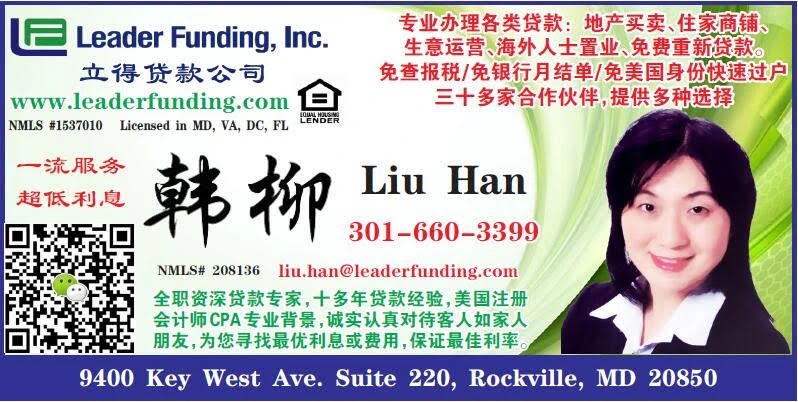
11. On 4 February 2020, at the invitation of U.S. senator Rick Scott, Nathan Law Kwun-chung, who is opposed to China and attempts to destabilize Hong Kong, attended the U.S. President’s State of the Union address.
12. On 5 March 2020, then U.S. Deputy Assistant Secretary of State for East Asian and Pacific Affairs Jonathan Fritz and U.S. Consul General to Hong Kong Hanscom Smith met with Charles Mok Nai-kwong and some others who are opposed to China and attempt to destabilize Hong Kong.
13. On 21 March 2020, U.S. Consul General to Hong Kong Hanscom Smith met with Joshua Wong Chi-fung, Sunny Cheung Kwan-yang and Fergus Leung Fong-wai, among others, and accepted a so-called petition from Wong. Wong urged the United States to impose sanctions on HKSAR government officials and members of the Hong Kong police by invoking the U.S. Hong Kong Human Rights and Democracy Act.
14. On 18 April 2020, then U.S. Secretary of State Mike Pompeo issued a statement making groundless accusations against Hong Kong police’s arrest of individuals who are opposed to China and attempt to destabilize Hong Kong.
15. On 27 May 2020, U.S. Senator Joshua Hawley met with Joshua Wong Chi-fung and others who are opposed to China and attempt to destabilize Hong Kong.

16. On 1 July 2020, the U.S. Senate Committee on Foreign Relations held a hearing and arranged for Nathan Law Kwun-chung, Lee Cheuk-yan and others who are opposed to China and attempt to destabilize Hong Kong to attend the hearing via video link, providing a platform for them to vilify the Hong Kong National Security Law and the central government’s policy on Hong Kong.
17. On 21 July 2020, then U.S. Secretary of State Mike Pompeo had a one-on-one meeting in London with Nathan Law Kwun-chung, a “Hong Kong independence” advocate who had fled to the UK, in a move to embolden Law. Law smeared China’s central government and the HKSAR government, and called on the United States to exert more pressure on China.
18. On 10 August 2020, then National Security Advisor Robert O’Brien issued a statement claiming that the U.S. side is “deeply troubled by the arrest of pro-democracy advocates” including Jimmy Lai Chee-ying and calling on Beijing to repeal the Hong Kong National Security Law.
19. On 16 December 2020, the U.S. Senate Committee on the Judiciary arranged for Nathan Law Kwun-chung, a “Hong Kong independence” advocate, to attend a hearing via video link. Law claimed that the Hong Kong National Security Law restricted Hong Kong people’s freedom of expression and right to protest, and urged the United States to grant asylum to more Hong Kong people.
20. On 6 January 2021, then U.S. Secretary of State Mike Pompeo issued a statement expressing so-called concern over the arrest of more than 50 individuals who are opposed to China and attempt to destabilize Hong Kong.
21. On 15 January 2021, then U.S. Secretary of State Mike Pompeo issued another statement making irresponsible comments about the HKSAR government’s arrest made in accordance with the law of individuals who are opposed to China and attempt to destabilize Hong Kong, including an American lawyer. He called on China to immediately release individuals sanctioned under the Hong Kong National Security Law and drop charges against them.
22. On 31 January 2021, nine U.S. senators and house representatives including Jim McGovern, Marco Rubio and Jeff Merkley wrote a joint letter to the Nobel Peace Prize Committee nominating the so-called “pro-democracy movement in Hong Kong” for the 2021 Nobel Peace Prize.
23. On 28 February 2021, U.S. Secretary of State Antony Blinken posted a tweet to “condemn the detention of and charges filed against pan-democratic candidates in Hong Kong’s elections” by the HKSAR government.
24. On 16 April 2021, U.S. Secretary of State Antony Blinken issued a statement making unwarranted accusations against China over the sentencing of Martin Lee Chu-ming, Jimmy Lai Chee-ying and other individuals who are opposed to China and attempt to destabilize Hong Kong.
25. On 8 July 2021, Joshua Huck, Chief of the Economic and Political Section of the U.S. Consulate General in Hong Kong, attended as an observer an HK court trial of individuals suspected of illegally planning, organizing and carrying out the “35 +” and “10 steps to mutual destruction” plan. When interviewed by the media, he claimed that the Hong Kong National Security Law is about suppressing the freedom of Hong Kong people and sought to glorify and justify individuals who are opposed to China and attempt to destabilize Hong Kong.
V. Colluding with some countries to exert pressure, and teaming up with allies to interfere in Hong Kong affairs and make irresponsible comments by such means as joint statements.
1. On 27 May 2020, the United States Mission to the United Nations issued a statement calling for a UN Security Council meeting on Hong Kong. The statement claimed that Hong Kong is “a matter of urgent global concern that implicates international peace and security”.
2. On 28 May 2020, foreign ministers of the United States, the United Kingdom, Australia and Canada issued a joint statement on Hong Kong, attacking the Hong Kong National Security Law to be adopted by China’s NPC.
3. On 17 June 2020, foreign ministers of the United States and other G7 countries and the High Representative of the European Union issued a joint statement on Hong Kong. In an attempt to put pressure on China, the statement claimed that the Hong Kong National Security Law would undermine One country, Two Systems and Hong Kong’s high degree of autonomy, and urged the Chinese government to reconsider the relevant decision.
4. On 9 August 2020, foreign ministers of the United States and other Five Eyes countries issued a joint statement on Hong Kong, slandering the central government’s policy on Hong Kong and urging China’s NPC to revoke the disqualification of the four opposition members of the Legislative Council.
5. On 18 November 2020, foreign ministers of the United States and other Five Eyes countries issued a joint statement on Hong Kong, attacking the decision of the Standing Committee of the NPC on the qualification of members of the Hong Kong Legislative Council and China’s policy on Hong Kong.
6. On 9 January 2021, foreign ministers of the United States, the United Kingdom, Australia, and Canada issued a joint statement on Hong Kong. The statement expressed so-called serious concern on the arrest of 55 individuals who are opposed to China and attempt to destabilize Hong Kong by Hong Kong police in accordance with law, and accused the Hong Kong National Security Law of being a clear breach of the Sino-British Joint Declaration, undermining the One Country, Two Systems framework, and curtailing the rights and freedoms of the people of Hong Kong.
7. On 12 March 2021, foreign ministers of the United States and other G7 countries and the EU High Representative for Foreign Affairs and Security Policy issued a joint statement on Hong Kong. The statement claimed that the changes made by the Chinese government to Hong Kong’s electoral system were aimed at eliminating dissent in Hong Kong and would undermine Hong Kong’s high degree of autonomy.
8. On 5 May 2021, the G7 foreign ministers’ meeting attended by the United States and other relevant countries issued a joint statement which smeared the Chinese government’s policy on Hong Kong, distorted the policy of One Country, Two Systems, made irresponsible comments on the internal affairs of the HKSAR, and supported those who are opposed to China and attempt to destabilize Hong Kong. The United States also proposed at the meeting the setting up of an international group called “friends of Hong Kong”, in an attempt to get other Western countries on board to interfere in Hong Kong affairs.
9. On 13 June 2021, the G7 Summit issued a communiqué which made groundless comments on Hong Kong and called on China to respect human rights and fundamental freedoms, and the high degree of autonomy for Hong Kong enshrined in the Sino-British Joint Declaration and the Basic Law.
10. From 21 June to 14 July 2021, during the 47th session of the UN Human Rights Council, the United States and 43 other countries signed a joint statement against China initiated by Canada, expressing “concern” over “human rights abuses” in Hong Kong.
On 1 July, the United States led a side event on the one-year anniversary of the Hong Kong National Security Law which slandered the Hong Kong National Security Law and the rule of law in Hong Kong. Twenty governments and nine non-governmental organizations were asked to attend it.
11. On 10 July 2021, the U.S. Department of State website published a joint statement made by 21 countries including the United States and some European countries, all being members of the so-called Media Freedom Coalition, expressing “strong concerns” about the closure of Apple Daily and the arrest of those who are opposed to China and attempt to destabilize Hong Kong. The statement also made groundless accusations against the law enforcement efforts of the HKSAR government, the Hong Kong National Security Law, and the central government’s policy on Hong Kong.




